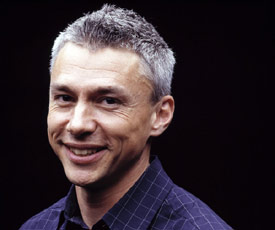 |
 |
 |
|
 |
 |
 |
 |
Olympic
triple-jumper Jonathan Edwards returns with a second series
looking into the way science shapes and explains our
world.
|
 |
 |
 |
 |
|
Programme 1 -
Beauty
In the first programme, Jonathan looks into
beauty. As he says, 'Beauty is a term we use almost without
thinking. We apply it to all manner of things: people,
objects, paintings. But the moment you stop for a moment and
try to analyse what we mean by “beauty”, it suddenly becomes
extraordinarily complicated'.
Jonathan goes to the
National Gallery and meets curator Colin Wiggins. Colin shows
Jonathan three paintings: Gainsborough’s The Morning
Walk, Wright’s An Experiment on a Bird in the Air
Pump and Seurat’s Bathers at Asnieres. All are
“beautiful” in different ways.
Outside the Gallery in
Trafalgar Square, Jonathan meets Dylan Trigg, a philosopher
from the University of Sussex. Dylan argues that there is no
necessary connection between beauty and aesthetic pleasure. On
the contrary, Dylan believes that transient, outmoded and
ephemeral spaces can also be aesthetically pleasing.
But Jonathan recognises that sometimes beauty seems to
work on our senses automatically - we’re moved by something
without having to think about it first. Why should this be?
Jonathan goes to the University of Bristol to meet
some experimental psychologists: Ian Penton-Voak tells
Jonathan about some of the implicit, evolutionary meanings
embedded in our faces. Innes Cuthill and Tom Troscianko try to
give Jonathan an answer to one of the most perplexing
questions of all: why do we find sunsets
beautiful?
 Listen
again to programme 1 Listen
again to programme 1 |
 |
|
 |
|
Programme 2 -
Sports Psychology
In the second programme in the
series, Jonathan asks whether mental attitude can have a
bearing on an athlete’s performance. When Jonathan was winning
triple-jump gold medals, sports psychology was not as popular
as it is now.
For today’s athletes, training regimes
concentrate as much on the mind as the body. Jonathan is
intrigued.
He goes to Sheffield Hallam University’s
Centre for Sport and Exercise Science, and talks to Pete
Lindsay about different types of sports psychology.
These days, Jonathan enjoys playing golf. He wonders
if a session of hypnotherapy might help improve his chipping
and putting.
He also talks to Dave Collins,
Performance Director for UK Athletics. Dave is a trained
psychologist and he’s sure that athletes perform better when
they are in a positive frame of mind.
Heptathlete
Kelly Sotherton agrees. After winning a bronze meal at the
Athens Olympics, her performances dipped. She tells Jonathan
about the way sports psychology has helped her to improve her
results.
 Listen
again to programme 2 Listen
again to programme 2 |
 |
|
 |
|
Programme 3
- Artificial Intelligence
In the final
programme in the series, Jonathan looks into Artificial
Intelligence. A keen fan of science fiction, especially films
like The Matrix, Jonathan wants to know how much
science fact there is in AI.
Jonathan visits the
Department of Informatics at Edinburgh University, where
scientists research a range of AI issues and
applications, and gets a crash course on machine learning
and voice synthesis.
He also discusses the convergence
of biological and technological worlds, and hears about an
intelligent system designed to help us deal more efficiently
with emergencies.
After talking to a philosopher about
concepts of intelligence, he rounds off his day playing
Connect Four with a talking, thinking, moving robot.
Having seen what AI can do, Jonathan emerges with
renewed respect for a biological machine that’s all too often
taken for granted - our own bodies.
 Listen
again to programme 3 Listen
again to programme 3 |
 |
 |

RELATED
LINKS |
 |
 |
Programme
1:
National
Gallery
Sussex
University: Dylan Trigg
Department of
Experimental Psychology, University of
Bristol
Programme 2:
Sheffield Hallam University:
Centre for Sport and Exercise
UK
Athletics
Programme 3:
Department of Informatics,
Edinburgh University
Jonathan
Edwards Looks Into...Series 1
BBC Science &
Nature
The BBC is not responsible for the content of external
websites
|
 |
 | |
 |
|